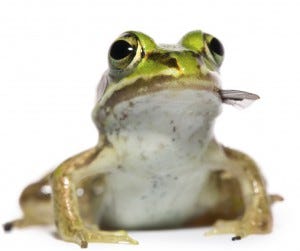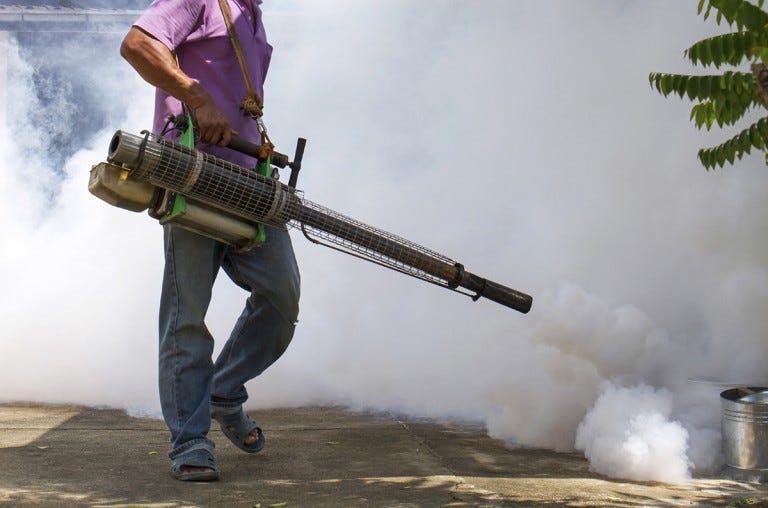
Its dusk: you walk out onto your patio to enjoy a nice glass of iced tea as the sun sets. You spend hours enjoying the fresh summer air as the night melts away the remaining heat. Afterward, you head inside completely relaxed, to nestle into bed for a comforting and rejuvenating sleep. Notice something missing? Mosquitoes. No mosquitoes buzzing around your head while you relax. No itchy bites waking you up to scratch in the middle of the night. It’s true: mosquitoes are annoying to the human race - not only annoying, but dangerous. They are known to transmit diseases such as malaria, dengue fever, West Nile virus and, most recently, the Zika virus among many others. With such clear and present danger, wouldn’t it be best to get rid of all mosquitoes?
What is the Purpose of Mosquitoes in the Ecosystem?
When considering the complete eradication mosquitoes, we have to think of the potential consequences of such actions. First, we have to ask a few questions; what is the purpose of mosquitoes and what do mosquitoes do for the ecosystem? Mosquitoes are found on almost every continent, and have been on the earth for more than 100 million years. That’s saying something, isn’t it? There are over 3,500 named species of mosquitoes, and of those species, only 6% actually feast on us. Remember, it’s only the female mosquito who bites us, using our blood to promote proper and successful reproduction.
Who Benefits from Mosquitoes?
When we think of mosquitoes, we tend to focus on the negative – but mosquitoes can’t be all bad, right? A number of animals consume mosquitoes as a significant portion of their diet. Birds In a climate not often associated with mosquitoes – the arctic tundra – dense clouds of freshly-hatched mosquito young feed the hungry masses of local and migrating birds. Other birds such as the Baltimore oriole, eastern bluebird, common nighthawk and downy woodpecker find mosquitoes to be a delectable treat. Along with having a light snack of mosquitoes, the purple martin eats the dragonfly, and the dragonfly feeds on mosquitoes. Mammals Caribou migration is also affected by the mosquito population, in that they avoid the mosquitoes and travel to new, localized ecosystems where they may bring along diversity and change. Bats, in particular, enjoy a good mosquito meal. You can see them swooping around at dusk gathering up as many as they can. Did you know there are even some species of mosquito that humans can eat? Fish, Reptiles and Amphibians
 Elsewhere, aquatic animals, such as the mosquitofish, feed on mosquitoes. Mosquitofish specifically snack on the mosquito larvae, and may have trouble finding a new source of food if they went extinct. To a lesser extent: bass, catfish, guppies and goldfish also dine on mosquitoes and their eggs and larvae - as do amphibious creatures such as frogs, toads and salamanders. Additionally, turtles and snakes will take part in the feast of mosquitoes. Plants Mosquitoes also play an important role in the tiny ecosystem existing inside of pitcher plants. After an insect drowns in the pitcher plant, midges and bacteria go to work digesting the carcass, and then mosquito larvae feed on the waste – creating essential nitrogen for the plant. Since mosquitoes like to imbibe the nectar of many varieties of plants, they act as pollinators. With the decline of bees as pollinators, mosquitoes have been a welcome help to many species of plants including cocoa and orchids.
Elsewhere, aquatic animals, such as the mosquitofish, feed on mosquitoes. Mosquitofish specifically snack on the mosquito larvae, and may have trouble finding a new source of food if they went extinct. To a lesser extent: bass, catfish, guppies and goldfish also dine on mosquitoes and their eggs and larvae - as do amphibious creatures such as frogs, toads and salamanders. Additionally, turtles and snakes will take part in the feast of mosquitoes. Plants Mosquitoes also play an important role in the tiny ecosystem existing inside of pitcher plants. After an insect drowns in the pitcher plant, midges and bacteria go to work digesting the carcass, and then mosquito larvae feed on the waste – creating essential nitrogen for the plant. Since mosquitoes like to imbibe the nectar of many varieties of plants, they act as pollinators. With the decline of bees as pollinators, mosquitoes have been a welcome help to many species of plants including cocoa and orchids.
Mosquitoes as Knights of the Rainforest
Think of the equatorial rainforest, absolutely infested with mosquitoes, but exploding with plant, animal and insect species – some of which have yet to be discovered. Mosquitoes have become the defenders of such precious diversity, keeping humans from wanting to enter such areas.

What Methods for Killing Mosquitoes have been tried?
Assuming that we found a way to actually eradicate all mosquitoes, we have to question whether or not our method was moral and safe. Does it create a problem down the road for other beneficial flying insects? Some of the current methods for eradicating mosquitoes include:
- RNA interference – These insecticides cause “cell suicide” in the female of the Aedes aegypti species, however, it has not been developed for use in large quantities.
- Male Sterilization – In an ideal situation, as in the case of the screwworm, this process would slowly end the ability for mosquitoes to reproduce, but has not yet been widely tested.
- Chemicals – Mosquitoes have begun to resist commonly used chemicals that typically target the nervous system. Much more research would need to be done to create a newer and safer chemical for widespread use.
- Trapping – Perhaps the most successfully-tested way to remove mosquitoes from a particular area is trapping. For example, the population of mosquitoes was considerably decreased on an island off the coast of Florida by the United States Department of Agriculture (PDF). This was done by using traps that produced carbon dioxide to attract mosquitoes – and not attract any of the helpful flying insects.
What is the Ecological Cost of Eradicating Mosquitoes?
Keeping in mind that mosquito-related illnesses kill millions of humans and pets each year, we might suppose that there is no harm in getting rid of all mosquitoes. But consider the uncertainty – what other creature rises to fill the mosquito void? There is a host of biting and flying insects that would love to move up the ranks such as the biting black fly, and midges – bringing along with them a potential host of new diseases to spread. And what about the species that rely so heavily on mosquitoes – the pitcher plan, mosquitofish, and little forest bat could succumb to extinction, causing a chain reaction of food loss and extinction for other species. The truth is that we really don’t know – we can’t know for sure - but the risks could very well outweigh the benefits.
What can I do to get rid of Mosquitoes in my Backyard?
To avoid the moral issue of whether or not to completely eradicate mosquitoes, there are simple solutions to keep your own family and yard safe from these buzzing pests. Wearing long-sleeved shirts and long pants can help deter mosquitoes from taking a bite, as well as the use of essential oils such as eucalyptus and lemon. If you’re looking for a barrier option, try planting marigolds around the patio or porch. Setting traps is helpful in reducing the population of mosquitoes in your area, leading to a lower chance of mosquito bites. Mosquito Magnet® mosquito traps – the same as used by the USDA in the above study –are a powerful home mosquito trap that kills mosquitoes and disrupts their breeding cycle all season long. Mosquito Magnet® mosquito traps work by releasing a precise and steady stream of carbon dioxide, heat, moisture and a secondary attractant to lure mosquitoes. The mosquitoes are then vacuumed into a net, where they dehydrate and die within 24 hours. Find out more about Mosquito Magnet® by signing up for our E-Newsletter and visiting Mosquito Magnet® on Facebook.



